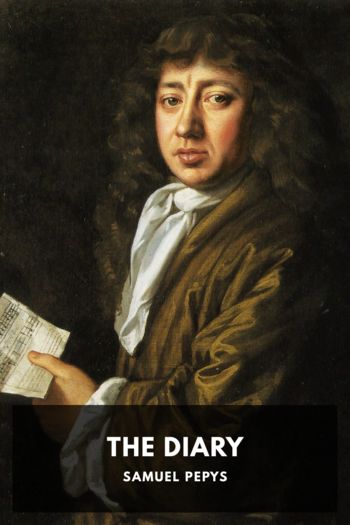The Diary - Samuel Pepys (red white and royal blue hardcover txt) 📗

- Author: Samuel Pepys
Book online «The Diary - Samuel Pepys (red white and royal blue hardcover txt) 📗». Author Samuel Pepys
It appears that Robert Wayth kept his office of Navy Paymaster, and that Mr. Hutcheson or Hutchinson was appointed paymaster also. ↩
There is a note in the margin respecting the passage between brackets: “All this belongs to tomorrow in the afternoon.” ↩
Robert Shafto, knighted June 26th, 1670, and made serjeant-at-law in 1674. He died May 21st, 1705, aged seventy-two, and was buried in St. Nicholas’s Church, Newcastle. He married Katharine, daughter and co-heir of Sir Thomas Widrington, of the Grange, Yorkshire. ↩
See March 30th, 1668. It was he who, in 1673, petitioned against Pepys’s return for Castle Rising. See Life, in vol. i, p. xxxi. ↩
The inhabitants of Newcastle. ↩
Apparently this is Martin Clifford, Master of the Charterhouse in 1671. Little good is recorded of him, and he appears to have obtained his mastership through the influence of the Duke of Buckingham. He assisted that nobleman in the preparation of the Rehearsal, and his assistance is alluded to in the Session of Poets:
“Intelligence was brought, the Court being set,
That a Play Tripartite was very near made;
Where malicious Matt Clifford and spiritual Spratt
Were joined with their Duke, a Peer of the Trade.”
(See Dict. of Nat. Biog.) ↩
Whetstone Park is a narrow roadway between the north side of Lincoln’s Inn Fields and the south side of Holborn, named after WiUiam Whetstone, a tobacconist and overseer of the parish of St. Giles-in-the-Fields in the time of Charles I and the Commonwealth. ↩
A romance by Gauthier de Costes, Seigneur de la Calprenede. It was translated into English by Sir Charles Cotterell, whose translation passed through several editions. ↩
I.e., precedence. ↩
See January 9th, 1664–65. ↩
Among the State Papers, 1668, is a petition from Peter Massonnet to Lord Arlington:
“Is the saddest object of pity of all the king’s servants. Has attended 32 years as French sub-tutor and writing-master, served him in adversity as Clerk of the Patents and Foreign Secretary, but at the Restoration had only his sub-tutor’s salary continued, now £833 in arrear, so that he is ready to perish; will resign his patent for the arrears and some recompense.”
Calendar of State Papers, 1668–69, p. 129↩
Laud. See September 16th, 1668. ↩
Lord Keeper, Sir Orlando Bridgman. ↩
Stow speaks of “the Conduit of Holborn Cross, erected about 1498: again new made by Mr. William Lamb, 1557. Hence called Lamb’s Conduit.” —B. ↩
Pepys’s cousin by marriage, Thomas Stradwick. See September 13th, 1660. Bunyan died in 1688, at the house of his friend, Mr. Stradwick, a grocer, at the sign of the Star, on Snow Hill. ↩
Dated, Whitehall, November 25th, 1668. See a copy of it in Harl. MS. 6003. ↩
Sir William Penn’s address to the Duke of York in reply to the Duke of York’s letter is printed in Penn’s Memorials of Sir W. Penn, vol. ii, p. 514. In this his absences from the office are accounted for or explained by reason of his ill-health. ↩
Sir William Warren had several contracts with the Navy Commissioners for timber. In December, 1668, he had a contract for elm timber. ↩
Though our journalist prided himself not a little upon becoming possessed of a carriage, the acquisition was regarded with envy and jealousy by his enemies, as will appear by the following extract from the scurrilous pamphlet, A Hue and Cry after P. and H. and Plain Truth (or a Private Discourse between P. and H.), in which Pepys and Hewer are severely handled: “There is one thing more you must be mightily sorry for with all speed. Your presumption in your coach, in which you daily ride, as if you had been son and heir to the great Emperor Neptune, or as if you had been infallibly to have succeeded him in his government of the Ocean, all which was presumption in the highest degree. First, you had upon the fore part of your chariot, tempestuous waves and wrecks of ships; on your left hand, forts and great guns, and ships a-fighting; on your right hand was a fair harbour and galleys riding, with their flags and pennants spread, kindly saluting each other, just like P[epys] and H[ewer]. Behind it were high curled waves and ships a-sinking, and here and there an appearance of some bits of land.” ↩
John Lanyon, agent of the Navy Commissioners at Plymouth. The cause of complaint appears to have been connected with his contract for Tangier. In 1668 a charge was made against Lanyon and Thomas Yeabsley that they had defrauded the king in the freighting of the ship Tiger (Calendar of State Papers, 1668–69, p. 138).





Comments (0)